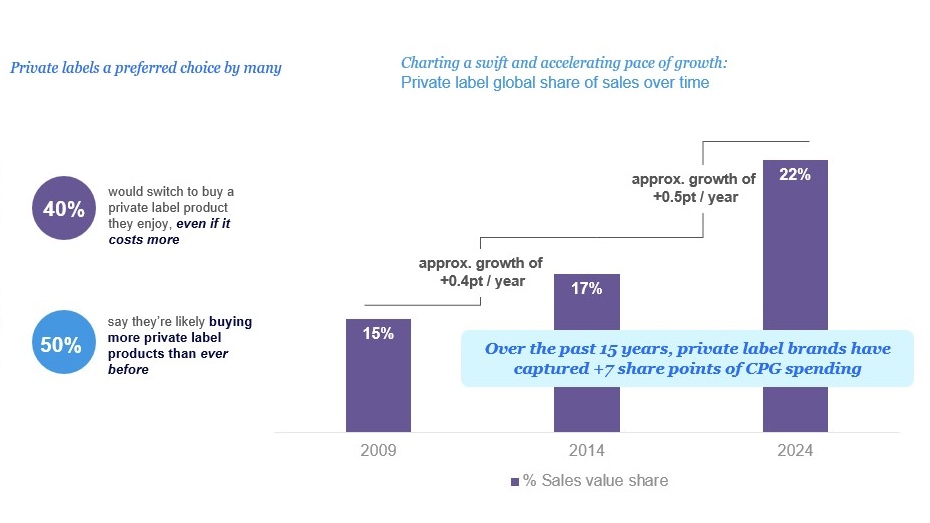- Private labels are no longer just a low-cost alternative; they’ve emerged as a strategic growth engine for retailers worldwide. Recent insights and innovations in this space highlight how consumer preferences, economic pressures, and technological advancements are reshaping the private label landscape. Private labels have become a critical tool for fostering customer loyalty, offering unique products and value propositions that keep shoppers coming back.
- Retailers now face a pivotal opportunity to meet evolving consumer demands through technology. Economic uncertainties and the rising appetite for value and innovation are fueling private label growth, especially in premium and niche categories. By leveraging AI and SaaS platforms, retailers can address operational challenges and unlock pathways to sustainable growth.
- As private labels gain momentum, the challenge lies in turning these opportunities into sustainable growth. Here’s how retailers can tackle the landscape head-on.
The rise of private labels
Globally, private labels have been steadily gaining momentum, with their growth often outpacing that of national brands. Evolving from being a low-cost alternative to becoming a significant player in the retail market. In the past year, Private Label delivered nearly 8% of CPG sales growth.

Several key factors are reshaping consumer behavior and retail strategies, contributing to this evolution.
Economic uncertainties have made value a priority for many shoppers, prompting them to consider private labels as reliable options that deliver quality at an attractive price. Simultaneously, retailers are elevating private labels through customization and innovation, introducing premium and niche offerings that cater to trends like sustainability, wellness, and convenience.
This shift is enabling private labels to compete not just on price but also on relevance and uniqueness, transforming the role of private labels from being supplementary to becoming essential drivers of customer loyalty and market differentiation.
Turning challenges into opportunities: Overcoming private label challenges to drive retail growth

Balancing cost and quality
Maintaining competitive pricing while ensuring quality that meets or exceeds consumer expectations.

Supply chain management
Supply chain disruptions can impact private label availability and quality consistency.

Data silos
Retailers often struggle to access integrated insights for timely decision-making.

Competitive pressures
As private labels become premium, competition with established brands intensifies.
Bridging the gap between understanding market dynamics and successfully launching or growing a private-label brand is driven by a combination of advanced technology, data, and actionable insights. In today’s rapidly evolving retail landscape, where every click, preference, purchase, and market trend provides valuable information, retailers need a centralized platform that can collect, analyze, and act on this data.
Retailers with access to both consumer and market data, combined with powerful analytics tools, can identify emerging trends, unique consumer preferences, and untapped product opportunities. More importantly, they can pinpoint gaps in the current market offering, allowing for the creation of private-label products that meet both current demands and future needs.
Through a unified platform that integrates data, insights, and actionable strategies, retailers can gain a comprehensive view of category performance, enabling them to spot areas where private-label brands can thrive. This deeper understanding fosters stronger consumer relationships, driving increased basket sizes and building trust and reliability. Additionally, data-driven insights support the identification of cross-sell opportunities, helping retailers strategically align promotions and assortment decisions to boost sales and enhance customer satisfaction.
Shaping the future of private labels

The future of private labels lies in innovation, consumer insights, and operational efficiency. Retailers who embrace advanced technologies and AI platforms to drive action and measurable value are positioning themselves to lead the next phase of private label growth, transforming them into a cornerstone of their business strategy. By combining deep consumer understanding with advanced data analysis, private labels have the potential to become not just alternatives to national brands, but essential assets that drive loyalty, retail growth, and long-term success.
Looking ahead, the private label landscape is set to evolve even further. Retailers must navigate an increasingly dynamic market by constantly understanding their consumer preferences and leveraging real-time data to pre-empt market shifts. Success will be defined not only by the ability to introduce private label products but by the capacity to continuously adapt and optimize offerings based on data-driven insights. Effective promotion plays a crucial role in driving visibility, engagement, and sales, allowing retailers to create targeted marketing strategies, identify new opportunities, and ensure sustained growth through informed decision-making and robust performance monitoring.


Revolutionize your Private Label Strategy
Leverage the power of advanced technology, actionable insights, and data-driven decision-making to stay ahead in the competitive retail landscape. Connect with an expert today and uncover how to turn challenges into opportunities for sustainable growth.




